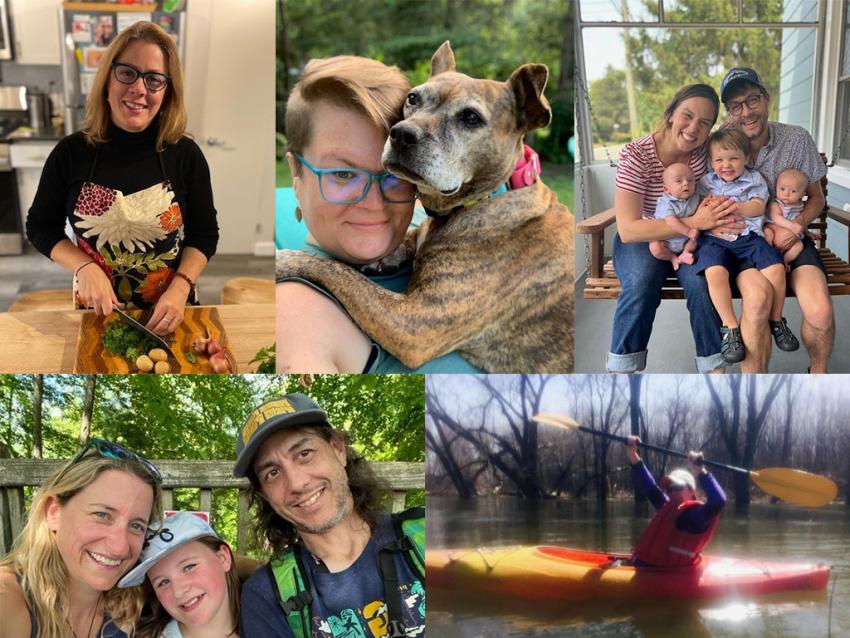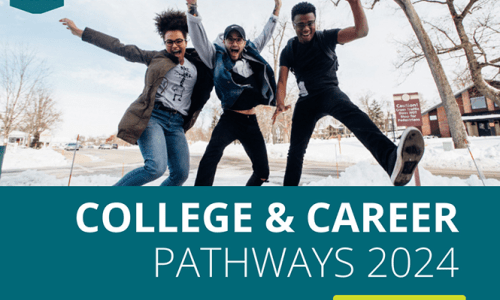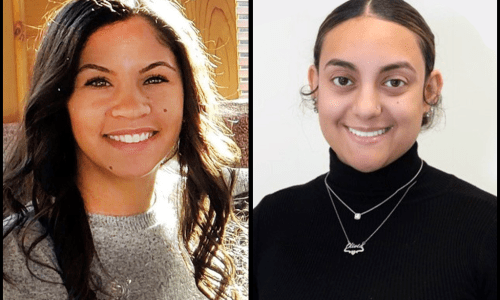VSAC transferred the servicing of your Federal Student loans to American Education Services and the guarantee of all VSAC Federal Student loans to the Trellis Company, an approved Federal Guaranty Agency, over the weekend of March 16th. CLICK HERE for more information.
Celebrating first-generation day with VSAC: Meet 5 first-gen staff on our team

For First Generation Day, meet first-gen students who now work for VSAC: Jessi Krause Herron (bottom left), Monda Kelley (bottom right), Dylan Bertolini (upper right), Beth Clay (upper middle), Sarah Friend (upper left).
If your parents didn't graduate from college, you're less likely to pursue college or career training after high school. It makes sense; while not all parents explicitly encourage their children to follow in their footsteps, it’s easier to talk to your kids about life paths you've walked. But when children are creating their own path, it's harder to actively spark and support their interest when you have zero experience.
According to VSAC research, in Vermont, 41% of graduating high school seniors in 2022 were considered first-generation students, meaning that neither of their parents completed a 4-year college degree. While 72% of the 2022 graduating class planned to go on to college – either at a 2-year or a 4-year program – that percentage fell to 58% if a student was first-generation.
Federally funded programs like VSAC’s Gaining Early Awareness and Readiness for Undergraduate Programming (GEAR UP) are working to help students find their paths after high school graduation. GEAR UP provides additional supports to first-generation students at the middle and high school level to help them aspire to, and enroll in, higher education.
A future for today's first generation
The data shows encouraging progress. According to VSAC’s Senior Survey studies, a majority of Vermont’s high school graduating class of 2001 didn't have a parent at home with a four-year degree. However, that changed by 2014. And in the years since, more and more Vermont high school seniors have at least one parent with a bachelor’s degree.
In 2017, the Council for Opportunity in Education launched the inaugural First-Generation College Celebration Day to honor the success of first-generation college students. Now celebrated each year on November 8, first-gen day event as a reminder of the systemic barriers preventing many students from accessing higher education. First-Gen Day also serves as a reminder of the support aspiring students of all ages need to build thriving futures, families and communities.
Walk it, like we talk it
Kirstin Boehm, Director of Career and Education Outreach for VSAC, which has administered the GEAR UP, Educational Opportunity Center, and Talent Search programs in Vermont for over 20 years, estimates that over 75% of the students it serves are first-generation, and over 50% of VSAC’s Outreach staff were also the first in their families to go to college.
“Celebrating First-Gen Day is a way for us to walk our talk,” says Boehm. “We really value the perspective and skills that our First-Gen staff bring. Their lived experiences, combined with their professional skills and expertise, help us shape programming that is accessible, equitable, and meaningful for the students and families we serve.”
While First-Generation College Day is about achieving a four-year degree, counselors guide each student to find careers that are meaningful to them by reflecting on the many forms achievement may take. “It’s really important for the students we serve to see themselves in the people who are working with them, no matter what path they end up choosing.”
Aid, options, support
Jessi Krause Herron, who has worked as a VSAC Outreach counselor for the last seven years, is one such success story. Growing up in Brattleboro, Herron was the oldest of four children raised by a single mother, and the family depended on state programs to cover basic expenses. Despite her humble upbringing, she was always determined that she would go to college. But when the time came to apply, she had to figure out the financial aid forms by herself. “My mom had never even filed taxes, so she had no idea what to do,” she recalls.
Help in completing financial aid applications is just one of the services VSAC Outreach counselors provide to students and families. Herron stresses to students that they don’t have to figure it out alone, and that there are many aid and scholarship programs designed specifically for them. “Under the 802Opportunity program, for instance, you can go to CCV for free or almost free, and we’re here to help you apply,” she says.
Dylan Bertolini, another first-generation college student – and GEAR UP alum – who now counsels students as a VSAC Outreach counselor, also strongly recommends that students check out 802Opportunity.
“Especially for students who don’t know what they want to do, I work hard to convince them to apply for 802Opportunity. That program lets them go to college for free and get ahead in their careers at the same time,” Bertolini says.
Finding your own path
Beth Clay, who now works as a VSAC Outreach counselor in Vermont’s Upper Valley, was a first-generation student who wasn’t sure what she wanted to do. She became the first person in her family to graduate from college, earning a bachelor's, and later a master’s degree, from Plymouth State University. However, she notes that her journey wasn’t a straight line.
As an undergrad, she changed majors a couple of times, unsure what would set her up for the best possible career. Beth took a semester to work at Walt Disney World, studied abroad in Australia, and also had to pause her education for a semester because of Lyme disease. She also worked full-time while in school to keep on top of her tuition, and attended college close to home – allowing her to live with her grandparents – to minimize her expenses. While it’s never a bad thing to take time for life circumstances or to explore one’s options, Clay encourages students to take advantage of available resources, so even the paths that meander a bit can still be financially feasible.
“There's something about having people around who have traversed some of the same challenges students encounter – someone to ask questions,” Clay says. “I didn't know what I didn't know. I wish there had been something like VSAC when I was growing up in New Hampshire.”
Staying commited to growth
Sarah Friend, a Senior Human Resources Generalist at VSAC, grew up with parents who strongly valued education, but didn’t have the opportunity to earn formal degrees. She put herself through school, from an associate’s degree through a master’s, while working full-time, and she vividly recalls defending her master’s thesis with a newborn baby at home.
“Getting an education is a commitment, and it's also a lot of work. But it's well worth it,” she says. “It's an experience that shapes you in ways that you won't know until you push yourself and try. It's growth.”
For Monda Kelley, the growth opportunities that come from higher education aren’t just for the individual; college can also lift future generations out of poverty, and her children are living proof, she says.
Kelley grew up in East Jamaica, Vermont, as one of eight children, two of whom lived with a single parent. With the support of the TRIO Upward Bound Program, she and one of her brothers became the first people in her family to earn a college degree. After receiving a Bachelor of Fine Arts in writing from Johnson State College (now Vermont State University – Johnson), Kelley went on to earn her Master of Education from UVM. She’s been a VSAC Outreach counselor for 24 years.
She firmly believes that investing in her education allowed her to break the cycle of generational poverty. “Both of my children graduated from college and have successful careers that they wouldn’t be able to have without a college degree. They also paid off their college debt in less than three years,” she says. “I also hope that I have, over the course of my years with VSAC, helped the students with whom I have worked break the cycle of poverty in their own families.”
Financial stability for families and communities
VSAC’s Kirstin Boehm echoes the importance of education and training to both Vermont’s success and an individual’s pursuit of what she calls a “meaningful wage,” which she defines as “financial stability that allows individuals to support themselves and their families, and to have the time to do things that make them happy and contribute to vibrant communities.”
Boehm continues, “Vermont needs people with the skills that education and training provide. There are so many pathways, including apprenticeships, certificates, and two- and four- year degrees. We need all of these types of credentials in our economy, and our Outreach team is here to help you access any of those things.”
Bertolini, who now counsels students in the Northeast Kingdom, where he grew up, has a simple message for today’s first-generation students. “We can do anything,” he says. “And there are a lot more resources out there than you know. Let us help you find them.”
To learn more
Click here to learn more about VSAC's programs that directly serve first-generation students: GEAR UP, Talent Search, and the Educational Opportunity Center.
For information from VSAC on college and career planning and help with financial aid, see these events and resources. You can also email us info@vsac.org or give us a call at 800-642-3177.





